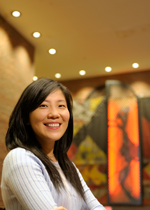by Robin Roenker
photos by Lee Thomas
Sometimes what a speaker means to emphasize and what a listener hears are two very different things. Subtle cues—like a rise in pitch—can be missed. That’s especially true when either the speaker or listener is using a language other than his or her native one.
Those language miscues are what most intrigue new UK professor Mingzhen Bao.
In just her first semester at UK on a joint appointment with the Linguistics Program and the Department of Modern and Classical Languages, where she teaches Chinese, Bao is poised to begin cutting-edge research on production and perceptions of speech prosody in Chinese.
By next semester, Bao will have her new phonetics lab at UK up and running, ready to perform experiments to analyze how American students learning and listening to Chinese perceive Chinese focus and accent as well as tonal distinctions.
What she learns could then help inform and improve the ways Chinese is taught as a second language.
 The research will be an expansion and extension of Bao’s earlier dissertation work, which she completed in earning her PhD in linguistics from the University of Florida in 2008. In that research, she analyzed native speakers production and perception of prominence among lexical tones in Mandarin Chinese.
The research will be an expansion and extension of Bao’s earlier dissertation work, which she completed in earning her PhD in linguistics from the University of Florida in 2008. In that research, she analyzed native speakers production and perception of prominence among lexical tones in Mandarin Chinese.
Bao is eager to expand her work to include second language learners, and she feels her joint appointment as an instructor of both linguistics and Chinese at UK is ideal for her particular research interests.
“My position here is a great match with my teaching and research interests. I have teaching interests in both language and linguistics courses. Here I can teach the language and get new ideas for my research in terms of how students acquire Chinese language skills, and study those from a linguistics perspective,” said Bao, a native of Hangzhou, China, and a graduate of China’s Zhejiang University, where she earned an undergraduate degree in English and a master’s degree in applied linguistics.
In her lab, Bao will have students record and listen to Chinese utterances. She will use spectrograms to chart their production of the acoustic parameters of those sounds, and use behavioral experiments for trainings and perception tests of sound discrimination and identification.
“We examine acoustic parameters to exploit how native speakers create emphases by producing utterances that contain contrastive focus and sentential accent. And then we compare parameters in production with cues used in perception of linguistic prominence to investigate if there are any (mis)matches in-between,” Bao explained.
Bao’s specialized knowledge of phonetics makes her an “absolutely stellar addition to UK’s linguistics faculty,” said Greg Stump, UK’s Linguistics Program director. “Her research draws upon the methods of both phonetics and psycholinguistics and has direct and profound implications for theories of language processing and acquisition, not only in relation to Chinese but in relation to the thousands of other tone languages spoken on this planet.”
Bao’s addition to the Modern and Classical Languages Department faculty has allowed UK to offer a 400-level, advanced Chinese class for the first time. Bao currently has five students in her advanced class, but she hopes that number will grow as Chinese course offerings at UK continue to expand and more introductory sections are offered.
As China solidifies its presence as a global power in the world’s economy, more and more students will want to learn Chinese in order to do business there, Bao said. Already, her UK students come from a variety of disciplinary interests—from economics and international relations to engineering.
Bao is excited by the momentum of the Chinese and Asian programs at UK, citing recent and planned new hires of faculty to focus on Chinese and Japanese language, literature, culture, and the goal of eventually offering majors and minors in Chinese and Japanese.
“Within two years we are looking at four new faculty members in this division. That is really exciting,” she said.
With just a few months at UK behind her, Bao has also been energized by the supportive research and learning atmosphere here, she said.
“We have a lot of seminars open to both faculty and students, where for example all the instructors of introductory linguistics can come together and share experiences to improve our teaching in the courses. And there have been career development seminars for young faculty members. All of these things make you feel like you’re being welcomed and at the same time give you an opportunity to make contributions to the learning environment here.”
